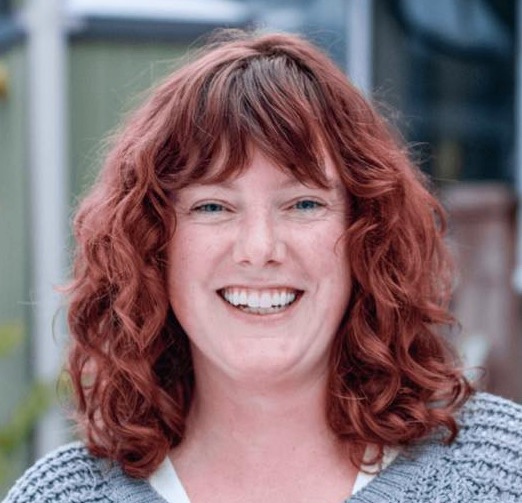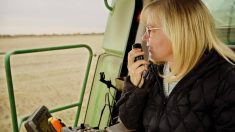I was standing in my kitchen, tears rolling down my cheeks that felt almost unstoppable. The voice of a good friend was playing on an audio message on my phone. The message was comforting — yet it also gave me a reality check. My friend was reminding me of all the changes I’d been experiencing since moving to my husband’s family farm north of Winnipeg two months prior: different house, new daycare for the kids, uncertainty about where I’ll work in town. As I listened to her talk, the tears continued to well up in my eyes. My kids were in the other room watching TV and for a second I wondered, “Do they notice me crying?” I reassured myself they would be preoccupied while I allowed myself to experience what was happening. I took a breath in and tried to let go of the tension in my body and give into the tears that were pushing themselves out.
Why do we try to control or hold back our emotions? Can we instead use them to help us understand how we experience life on the farm — especially changes we go through?
Having been raised in the Mennonite culture, I have a hard time knowing how and when to express my emotions. Since my mother was told by my grandparents to hide how she felt, she was intentional about raising my brothers and I to be open about our feelings as much as we felt comfortable. Despite her efforts, I was still immersed in a culture in high school and university that did not encourage this openness or make space for emotions. Experiencing emotions — let alone expressing them to or in front of others — was not something I was used to.
Read Also

Is the technology in our vehicles a help or a hindrance?
Not only does new tech allow people to operate vehicles and farm machinery with fewer skills, it also creates more problems for vehicle users when those systems fail, Scott Garvey writes.
Developed by psychology professors at Eckerd College in Florida, the Conflict Dynamics Profile tool indicates expressing emotions is a constructive — that is, healthy — conflict behaviour, one that can help us work through times of conflict (and, I would argue, times when we are experiencing changes). Identifying our emotions first helps us understand how to communicate them to others. But, if we’re raised to hide how we feel, it can be difficult to even begin to know what we’re feeling.
That day in my kitchen, it was hard to understand what I was feeling because although I was crying, it didn’t feel like sadness. A few days later, I remembered what I’d learned in a workshop about how people experience change. Every time a person goes through a major change in life, they experience a downward trend of negative emotions — often expressed as anger or sadness — before they can fully accept the change.
That concept comes from a visual called The Change Curve, first introduced in the 1960s by Elisabeth Kübler-Ross to explain the grieving process. As my trainer noted, we need to experience the downward slope — the bottom of the curve, where sadness or grief occurs — to move forward and fully accept the change.
Once I had identified I was feeling some type of grief, I gave myself some grace. As the U.S. academic Brene Brown notes, grief can have three elements: loss, longing and feeling lost. She writes, “The more difficult it is for us to articulate our experiences of loss, longing or feeling lost to people around us, the more disconnected and alone we feel.”
So now I was still left wondering: ‘What am I grieving? Am I feeling lost?’
My husband and I had been looking forward to moving to the farm for a few years. Our four-year-old daughter was old enough to feel excited about being closer to family, yet young enough to make new friends easily before starting school. We were leaving a small acreage in an area where we didn’t know many of our neighbours, and now embracing a farming lifestyle in a rural community where we already had many connections. It was a huge change for all of us, but one we were ready for, at least mentally. Our emotions had not yet caught up to all these changes. We were still at the bottom of the curve. The reality was that we still had a lot of planning to do with his parents, who have been cattle and grain producers for their sole income. There was still so much uncertainty in our future, even though we told ourselves we were making the right decision for our family to move to the farm. What we were longing for was what Elaine Froese calls the “three Cs” in farm transition: clarity of expectations, certainty of timelines and agreements, and a commitment to action.
READ MORE: Suddenly our life had changed
I turned to the book Bittersweet by the U.S. writer Susan Cain to give me some hope and insight into how this “grief” could help me feel ready for the next chapter our family was in. Cain’s book discusses how feelings of longing and sorrow “make us whole” and help us acknowledge the imperfections in life. She writes that moments of loss in life are just as important as moments of joy and success, arguing that our “highest states,” such as finding meaning, emerge from understanding the bittersweet nature of life. “These losses shape your psyche; they lay down patterns for all your interactions. If you don’t understand them and actively work to form new emotional habits, you’ll act them out again and again.”
While I have not yet discovered all the possible meanings about the grief I was experiencing, I am thankful that I cried that day. The release of emotions, and later the ability to talk about how I was feeling with my husband, was an important stage in the journey we are on together. My hope for farm families is that they can explore their emotions instead of hiding from them and acknowledge that how we feel can be an incredible indicator to learn what we need.
















